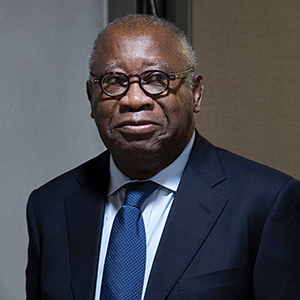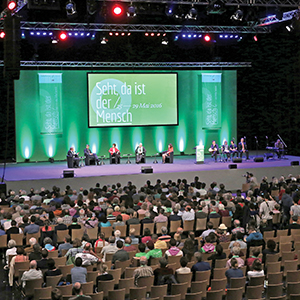The German Katholikentag congress held in the eastern city of Leipzig from 25 to 29 May this year gave a resounding endorsement of the country’s policy of welcoming migrants and refugees fleeing to Europe from the Middle East and Africa.
The lay-led event, organised by the Central Committee of German Catholics (ZdK), banned the anti-immigrant Alternative for Germany (AfD), which has a considerable following in Leipzig, from taking part.
The ZdK represents the concerns of Germany’s 25 million Catholics and advises the bishops’ conference on social, state and church issues. Cardinals, bishops, theologians, politicians and academics attend the congress, and church associations, religious orders and charities have stalls along the so-called “mile” (Meile) where it takes place. This year marked the 100th anniversary of the biennial gathering and 40,000 people attended.
The large German charity organisations held a “Refugees’ Day” on 27 May and called for greater solidarity with refugees. “We must show solidarity with all those fleeing from violence and must be solidly united among ourselves and share the burden,” the president of the German Bundestag, Norbert Lammert (a member of Chancellor Angela Merkel’s CDU and a Catholic) said. What he found “so depressing” was that so many Europeans were against taking in more refugees “because solidarity is not functioning on our Continent”.
German President Joachim Gauck, a former Lutheran pastor and anti-communist civil rights activist in the former East Germany, sharply criticised all those fanning fear in public debates on immigration, but at the same time said he understood those who were genuinely afraid of people they knew nothing about. The decisive point was how this fear was dealt with. “Serious debate and not fanning fears is called for,” Gauck underlined.
Archbishop Heiner Koch of Berlin said the ZdK’s decision not to invite the AfD was a “good thing”. Dialogue with the AfD was important but “the Katholikentag is not a party political congress. We do not want to give the AfD a large platform to air their opinions. That would be the wrong signal”, Koch told the German daily Nordwest-Zeitung.
Also discussed was the women’s diaconate, which the ZdK is fully in favour of.
The well-known Czech Catholic priest, theologian, philosopher and laureate of the 2014 Templeton Prize, Fr Tomas Halik, called on the Christian Churches to make far greater efforts to reach out to all those seeking the truth, as the number of those seeking faith was increasing. “The truth is, after all, a book no one has yet finished reading”, he observed.
Twenty thousand attended the final Mass celebrated by bishops’ conference president, Cardinal Reinhard Marx, on Sunday 29 May. It was the first time that a Katholikentag was held in largely secular eastern Germany.
Meanwhile the vicar-general of the Stockholm diocese, Fr Pascal Lund, who attended the Katholikentag, told the Catholic News Agency that Francis had decided to prolong his stay in Sweden planned for 31 October. The Pope had planned a one-day visit to Lund to mark the 500th anniversary of the Reformation with the Lutheran World Federation. He would now stay an extra day to celebrate Mass with the Catholic community on All Saints Day, 1 November. Speaking in German, Francis sent a message to participants, urging them to find more time to give a voice to the poor and the oppressed, and praising the good relations between Christians of different denominations in Germany.
02 June 2016, The Tablet
Catholics back ‘migrants welcome’ policy
 Loading ...
Loading ...
Get Instant Access
Subscribe to The Tablet for just £7.99
Subscribe today to take advantage of our introductory offers and enjoy 30 days' access for just £7.99



